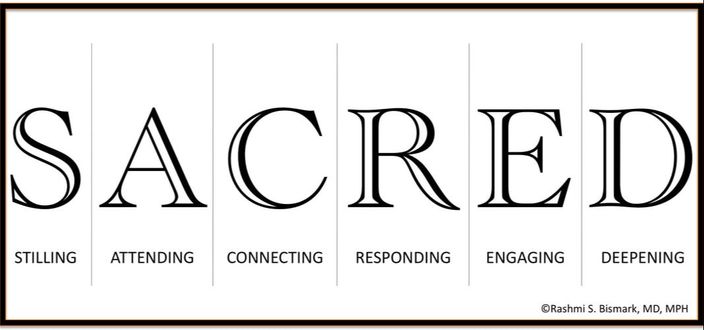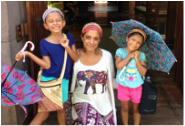|
When I first discovered Mindfulness-Based Stress Reduction (MBSR) as an evidence-based medical intervention for patients with a variety of stress-related indications, I was absolutely thrilled. Here was an elegant, beautifully thought out curriculum for teaching contemplative practices and mindful movement within the medical professional sphere. It was the perfect way for me to bridge my traditional self-care practices with patient care in a secular format. Done. I had found a home at last within my career. And when friends and family would ask about my clinical practice I’d happily let them know I was teaching yoga and meditation in a secular way through mindfulness-based interventions. “Oooo, aaaa, so nice,” they would say, “After all, contemplative and self-inquiry practices are not religious. They are examining the human condition.” Secular Mindfulness… My proud use of the word secular was rightly challenged though a few years ago, while attending my first professional teacher training retreat through the Oasis Institute (University of Massachusetts Center for Mindfulness). Well-respected mindfulness leader, Saki Santorelli, EdD, who co-created MBSR with Jon Kabat-Zinn, PhD, was one of the teachers. In one of his key lectures, Dr. Santorelli expressed that secular literally means devoid of sacredness. “Is this work we do with mindfulness really devoid of the sacred? From the beginning, it has never been anything but sacred. Sacred in the same way the doctor-patient relationship is and always has been sacred, held deeply in the spirit of the Hippocratic Oath to do no harm.” He went on to emphasize just how much heartfulness was embedded into cultivating a relationship with the self, those around us, the unfolding of life, and humanity. Rather than secularization of mindfulness, he and Dr. Kabat-Zinn preferred the phrase “mainstreaming of mindfulness.” My heart was deeply touched. Being a doctor and always having to justify the benefits of cultivating mindfulness through scientific and clinical evidence, it can be easy to be carried away into the science and vast array of conceptualizations. So as a way to always honor the SACRED aspects of mindfulness, I created a mnemonic. (I was after all a medical student at one point in my life, and one thing us med students were all experts at was creating tools for memory.) I initially created the mnemonic for myself as a way to pause and remember my intentions as I work with patients, but recently I shared it publicly while teaching at an advanced yoga teacher training with Yoga Medicine. It is still changing and evolving, but here it is as an offering to remind yourself of all the SACRED work you may already be doing everyday by just paying attention, on purpose, with kindness, playful curiosity, and care. S. Stilling – This is simply pausing, an invitation to tune in, just as a first violinist may pause to tune her instrument in sync with the orchestra before a performance begins. A. Attending – Bringing Attention to all the dimensions of being with Attitudes of care, curiosity, openness, patience, and kindness.
C. Connecting – Resting into a connection with innate awareness
R. Responding – Choosing skillful Responses
E. Engaging – Engaging with yourself and the entire world around you in more meaningful ways
D. Deepening – Deepening into the experience of humanity
2 Comments
Kelly Hennesy
10/9/2017 05:32:49 am
This is beautiful Rashmi! What an amazing gift this was to me this morning to help start my week clear and connected. Thank you. Sending light and love.
Reply
Kim
10/9/2017 04:32:25 pm
So inspiring Rashmi!
Reply
Your comment will be posted after it is approved.
Leave a Reply. |
Rashmi S. BismarkI'm a preventive medicine physician specialized in mindfulness, lifestyle, and community health. I'm a yoga teacher, an educator, a researcher, a devoted mom and expatriate wife, living a blessed global nomad life. Archives
May 2019
Categories |


 RSS Feed
RSS Feed